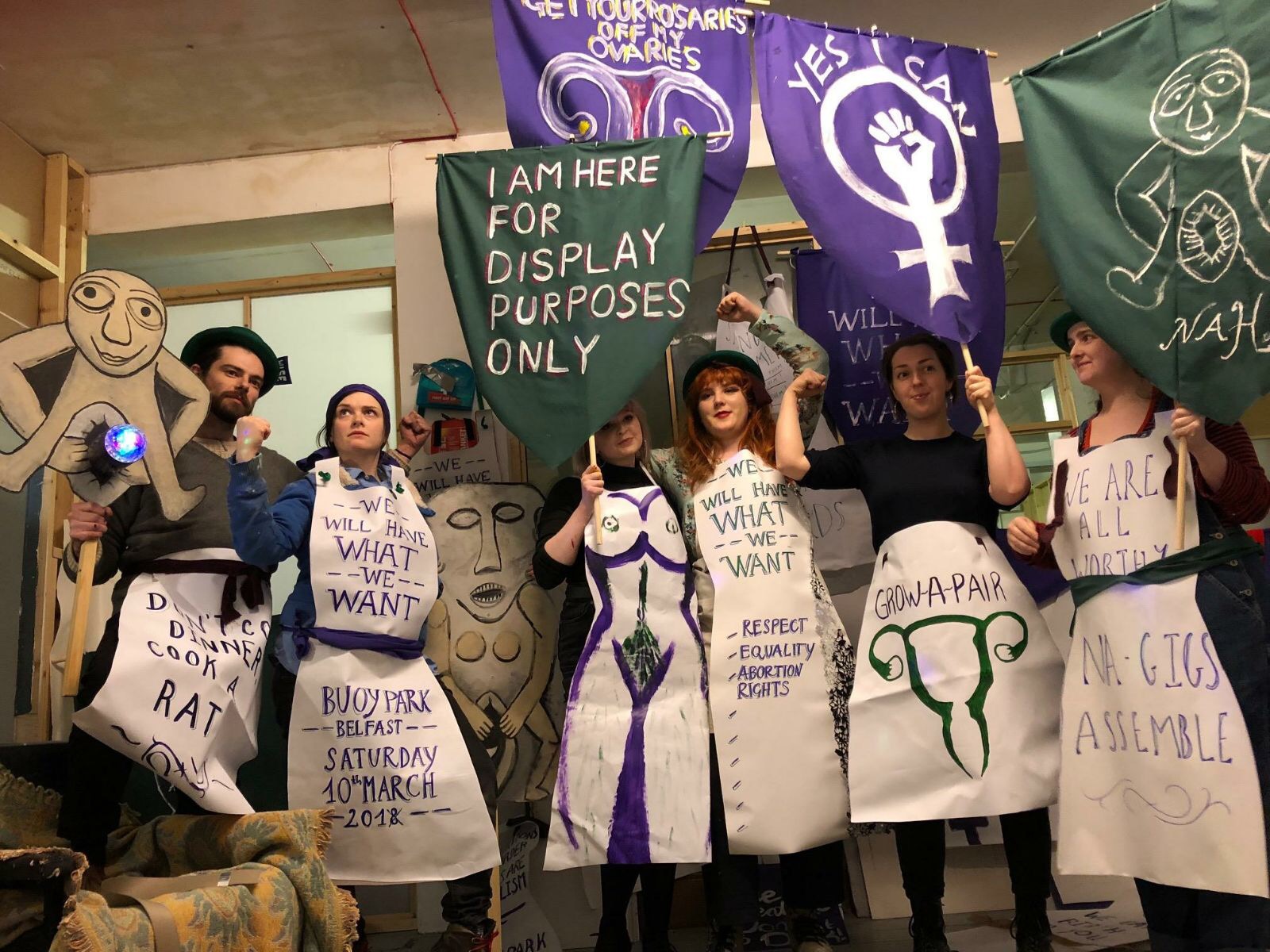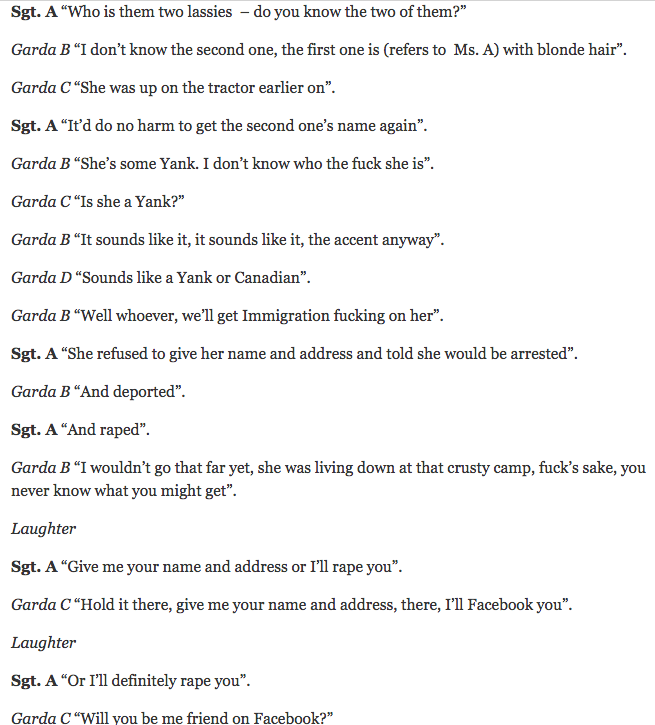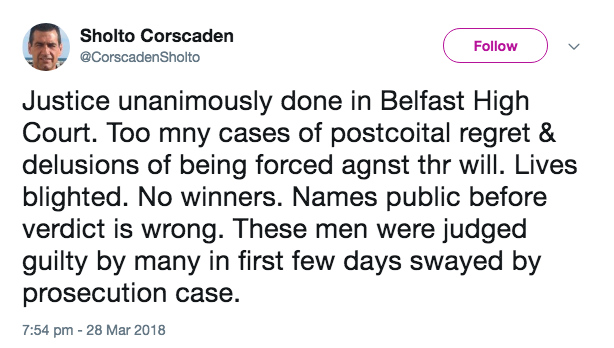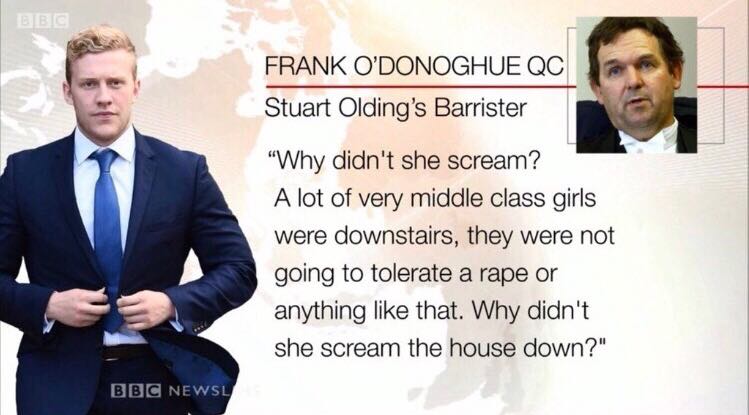The Global Women’s Strike in Ireland calls for a Yes/No vote (#VoteYesNo) on 8 March:
YES to extending the definition of the family in the Irish Constitution but NO to the care referendum.
On the 39th amendment,[1] the vote can only be YES. Despite an unhelpfully vague reference to ‘durable relationships’ (how will that be defined?), the new wording is more inclusive than the present definition based on marriage. Time must be called, once and for all, on the sadistic, sexist shaming of single mothers whose babies were killed or stolen while they were forced into slave labour in Mother and Baby Homes and Magdalen Laundries. And time must be called on the discriminatory and racist stereotypes which deny LGBTQI+ and immigrant families.
On the 40th amendment,[2] the care referendum, there are compelling reasons to vote NO. For decades we and others have campaigned to amend the current article 41.2,[3] updating the sexist language while, crucially, retaining and strengthening the obligation of the State to support caring and carers. The Citizen’s Assembly gave voice to this grassroots perspective and the Oireachtas[4] committee found the words: ‘The State shall, therefore, take reasonable measures to support care within and outside the home and Family.’[5] This was a break-through for everyone receiving and/or providing care, unwaged and waged, who now are both left to struggle.
Outrageously, the government has robbed us all of this vital, strengthening support by replacing a legally enforceable ‘obligation’ with an unenforceable ‘striving’. As increasing numbers of people are pointing out: they are proposing to remove the only constitutional recognition of caring work that mainly women do and replace it with a patronizing, sexist and discriminatory proposal which assumes women will continue to do this work without any payment or other resources (though women are no longer named), and those of us with disabilities will be denied our right to the support we need to live with dignity and to be able to choose who provides our care and support. This is the same government that has refused to ratify the Optional Protocol to the UN Convention on Rights of Persons with Disabilities. We say No to the slavery of invisible unwaged work and forced dependence! No to Victorian charity! No to the Workhouse or the Asylum!
The government’s timing is deeply suspect: a case before the Supreme Court challenging the reduction of carer’s allowance is testing the legal obligation of the State under the current wording of article 41.2. The court described the issues raised by the case as ‘of systemic importance to carers’ (Irish Times, 13/02/24). Instead of waiting for the ruling (the hearing is in April), the government is rushing through a vote on deleting the article – what kind of justice is that for the mother and her son at the heart of that case, and for all of us? And they have chosen International Women’s Day to slap us in the face!
We must wait for the judgement of the Supreme Court but since the government has refused to postpone the referendum until then, we must vote NO to their discriminatory language which denies mothers, other carers and all who need support, the resources we are entitled to, in the family and outside.
We are not the only ones calling for a Yes/No vote. The national Free Legal Advice Centres, the Irish Council for Civil Liberties, Justice for Magdalenes and a number of disability groups are also calling for a NO vote on the care referendum. A new disability rights network has formed for this purpose and Sinn Féin has said that, if they are in government after the next election and the vote is NO, they will revert to the Citizen’s Assembly wording and re-run the referendum. A NO vote is not a vote for the Ireland of the past but rather away from it. We must demand a better future.
Nothing can express better the public outrage at the government’s duplicity than the voices of those, from many sectors, who have spoken out against the government’s wording of the care referendum. We quote some of them here:
VOX POPULI: excerpts from letters, speeches and articles critical of and even opposed to the government wording on the care article taken to referendum on 8 March 2024[6]
We are being asked to vote on the abolition of Article 41.2 a month before the Supreme Court has an opportunity to consider what, in fact, the clause does mean for those providing full-time care in the home. Why?…The democratic thing to do would be to allow the Supreme Court to rule, enabling voters to make better informed choices on the referendum proposals. The referendum should be deferred until after the Supreme Court judgment. – Dublin, Irish Times
[T]he Constitution is not the place for aspirational waffle. Also it’s poorly timed given the Supreme Court has recently agreed to hear a case on whether 41.2 actually does confer enforceable rights. – Twitter
[I’m] a member of the Citizens’ Assembly on Gender Equality… I’m also a full-time carer. For two years we worked…with many legal experts on the wording…I find myself unable to support what I hand-on-heart supported 100%, as the onus is being put on the family of which most carers are women. I don’t have family to take care of my child after I die. So will he end up in a home, after fighting all his 22 years for services and listening to service providers talking about independence? The wording needs to go back to what the assembly proposed… – Anonymous, a member of the Citizens’ Assembly on Gender Equality, The Journal
[T]he word ‘strive’…is such a weak concept, and if past experience is anything to go by, meaningless. – Galway, a full-time carer for his wife, The Journal
Article 42 isn’t aimed at bettering the lives of disabled people, older people, or anyone in dire need of State support. It places continued responsibility for support on family members who are women in the main…As a disabled person, I will not be patronised and ignored. I will make my voice heard. I will vote No. – Co Clare, Irish Times
Last year, the Government set up the ‘Basic Income for the Arts’ scheme whereby workers in that sector receive a basic income paid from the public purse. Micheál Martin[7] said at its launch that ‘We need to invest in that which sustains us’. I am baffled as to why women’s groups – and women journalists – are not calling on the Government to make good the Constitution’s declaration that women who choose to work in the home give to the State ‘a support without which the common good cannot be achieved’ and demand that the Government pay women in the home a similar basic income. – Co Wicklow, Irish Times
The Constitution contains a direct recognition of the contribution of women, particularly mothers. This should not be thrown away, despite a need to recognise and fully support carers as a distinct group. – Dublin, Irish Times
The Government’s refusal to accept the wording of the Citizens’ Assembly…smacks of an attempt to embed neoliberal politics into the Constitution and replace a rights-based approach to disability with a Victorian charity model. If this referendum passes, I will go to my grave haunted by the fear of Ciarán, my grandson, ending up in the workhouse or its neoliberal equivalent. – Kilkenny, The Journal
I do not want the very small acknowledgement of my role and my work in the home to be removed from our Constitution.
Neither do I want the article to be replaced with gender-neutral waffle so that we can all pretend to be living in a perfect world where domestic work, the bearing, feeding and care of children, and the care when it’s needed of family elders and other dependents is shared equally between men and women. It isn’t! We all know it isn’t; the 2022 census showed that 90 per cent of people filling this role were women…
Instead of abolishing or amending this article, why don’t we hold the State to it? – Co Wicklow, Irish Times
The process of engaging with…state bodies to access care and support is, as any carer will tell you, nothing short of harrowing…For Roderic O’Gorman[8] to gushingly announce that this referendum will allow me to sue over this kind of mess is just insulting. Please support carers. We do not want charity. We want rights. – Anonymous, a carer for their 20-year-old son, The Journal
As a lifelong feminist, I canvassed widely for the Marriage Equality and Right to Choose referendums. I expected to be canvassing in favour of this one too and am heartbroken that I find myself voting no to 42B. The wording not only disappoints, it terrifies me. It deliberately obliges NOTHING from the State. It deliberately assigns the locus of care to the home and the duty of care to the family. It deliberately allows the HSE[9] and other Departments to use the Article as an excuse to deny. If I die before my partner, it leaves my partner with no right to care outside the family. It leaves my grandson and his family with no rights to care or to services… – Kilkenny, a carer for her partner and a helper to her son, who is a full-time carer for her grandson, The Journal
My youngest son was diagnosed privately with autism at age two…I left my job to care for him. I was a preschool teacher…I have had to source and fund private speech and language therapy, occupational therapy and other therapies to give him a good chance at life…Parents already have to go to court to vindicate their child’s rights. A change of wording in the Constitution to pure lip service. Another act of virtue signaling by an out-of-touch government. – Cork, a carer for her two sons, The Journal
As a father of two autistic children, it will be a no from me…What keeps me awake? Fear. The fear of what will happen to my 12-year-old boy when I’m gone whether that’s now or in 40 years. The State doesn’t care a jot…This entire referendum is a sham. – The Journal
A NO from me as a carer for 28 years…involved in support of those caring for almost 40 years. Anyone who votes in agreement with this wording is doing a terrible disservice to family carers. Every person voting has been a carer, will be a carer, or will need care during their lifetime. – The Journal
[T]hey are expecting us to vote blind and fight it out in court, they refuse to publish the minutes of the committee that drew up the wording so they are hiding something, and they are absolving themselves and the HSE from any responsibility towards carers or disabled people – The Journal
[I]t is essential to ensure that any Constitutional amendments do not inadvertently undermine the financial aid or support mechanisms crucial for women to make authentic choices about their familial and professional responsibilities. – Irish Times
It’s not Article 41.2 that has ‘delivered nothing for women…’, it is all the governments that failed to deliver on the promise of the article that no mother shall be ‘obliged by economic necessity to engage in labour to the neglect of their duties in the home’. – Dublin, Irish Times
Instead of strengthening protections for [mothers and fathers] at a time when housing and childcare are so expensive…they are toying with the Constitution again. It is progressive to reject such a proposal and to vote No to send it back for revision. – Dublin, Irish Times
I contacted the disability services manager…to find out what the plan now was for my adult son… [The social worker] asked whether he has a sister to which I replied ‘Yes’, …then asked: ‘Well then, what are you worried about? She will look after him when you die.’…[T]he majority of carers in the home, who are unpaid carers, are women and girls and siblings. This Article…which makes no reference to other supports in the community or outside the home, gives constitutional expression to that paternalistic and disempowering approach. – Senator Tom Clonan
All we appear to be missing from the Yes/Yes campaigns is a picture of a large green bus with ‘€350 million for Carers’ on the side. – Irish Times
[T]he proposed wording…may be worse than useless: a gesture that in fact indicates the State’s complete lack of intention to create the changes without which women will never be fully equal citizens. – Fintan O’Toole, Irish Times
[H]aving put all that emphasis on the fact that what people will get is ‘care’ (not rights, choice, resources) it then only says that it will strive to support it. This gives no extra rights to carers. – Twitter
As a social worker, I already know families up and down the country who are abandoned to provide full care which the State ‘strives to support’…Vote No.
NGOs who acknowledge wording is inadequate now suggest that a vote for something is better than nothing. Please remind them the onus is on the Govt to win the vote – not on the public to vote for weak proposals. – Twitter
As someone who grew up not knowing my identity or family of origin simply because I was born outside of marriage & adopted, I’ve lived the consequences of how family is defined in our Constitution. But I’m so disappointed…the proposed definition of care doesn’t pass muster. If you vote yes, you’re voting to leave people behind. – Twitter
The wording is paternalistic and is toxic to the rights of people with disabilities and carers…And yet so many NGOs and political parties…are settling for this…Reject, and reword with rights and respect for the dignity and autonomy of people with disabilities. – Dublin, Irish Times
The referendum wording…institutionalises people requiring care and support in the family home…and removes choice in how we are supported, exposes us to abuse by family carers and is contrary to the UN convention on rights of disabled people. – Twitter
There’s a very obvious effort to basically oppose any state of affairs where there could be any justiciable obligation on the State to actually provide care. Now, by justiciable here, I mean just simply something you could actually sue the State for. Okay? So words like ‘strive’, just like the word ‘endeavour’, they’re specifically chosen to avoid justiciable legal obligation. – Constitutional Law expert Dr Eoin Daly, Echo Chambers Podcast
The failure to follow the advice of both the Citizen’s Assembly on Gender Equality and the Joint Oireachtas Committee on Gender Equality to include both care within the home and wider community is a lost opportunity for the value of care in all its forms, the vast majority of which is provided by women… – Owen Reidy, General Secretary ICTU
Why do we have a Constitution if we do not put parameters and obligations on governments to do things that are at the very basic level essential for society? – Bríd Smith TD
‘Strive’ does not reflect the 81% of the citizens’ assembly members who preferred the word ‘oblige’. – Réada Cronin TD
De Valera’s State and McQuaid’s church…wrote blatant sexism into the Constitution, but what the Government is proposing to replace that with is disgraceful.
[A] legal obligation would open the door to improved carer’s allowance, improved foster care allowance, provision of better childcare and provision of better services for the elderly, people with disabilities and many others. – Mick Barry TD
The sealing of the mother and baby home records and the redress scheme, which is a disaster for survivors, show just how serious this Government takes its responsibility to address the State’s historic and current role in controlling women’s bodies and lives…
Some 98% of full-time carers are women. Some 98% of childcare staff are female. The hourly wage of childcare sector staff is 43.5% below the average national wage. Almost 80% of childcare workers do not have sick pay. Some 90% of childcare workers do not have a private pension. Some 65% of childcare workers do not have paid maternity leave. If the huge role women play in providing care, both paid and unpaid, in Ireland is not recognised, valued and supported, we are ignoring the reality of women’s lives in our society. – Joan Collins TD
How do we create the conditions in which a parent of either sex can be at home and not be forced out into a market by the demands of a neoliberal approach to society that has led us to the precipice with climate change and wars? That is a debate worth having. – Catherine Connolly TD
[E]conomic justice should animate the debate about care. The implicit balance for the last few decades between formal (paid) and informal (unpaid) care was all wrong. – Gerard Quinn, Prof Emeritus, University of Galway, former UN Special Rapporteur on the Rights of Persons with Disabilities, Irish Times
Free Legal Advice Centres (FLAC) supported the family amendment but described the care amendment as ‘ineffective’, ‘implicitly sexist’ and potentially compromising of the rights of people with disabilities… The Independent Living Movement Ireland (ILMI) confirmed it has withdrawn from the equality coalition, an alliance of civil society groups campaigning for equality, ‘as we are not in a position to endorse a Yes/Yes campaign based on the realisation of disabled people’s rights and fully implementing the UN Convention on the Rights of People with Disabilities’. – Irish Times 20/02/24
Sinn Féin promises to re-run referendums should they fail. Mary Lou McDonald sharply criticised the wording proposed by the Government, and the timing of the referendum – while urging a dual Yes vote. ‘Should this fail, the question we would put would be the wording as per the Citizens’ Assembly…That’s what should be happening now.’ – Irish Times, 21/02/24
[1] The government’s proposed wording for the 39th amendment involves altering article 41.1 to insert ‘whether founded on marriage or on other durable relationships’ after mention of ‘the Family’ and amending article 41.3 to delete ‘on which the Family is founded’ after mention of ‘the institution of Marriage’.
[2] The government’s proposed wording for the 40th amendment involves deleting article 41.2 completely and inserting a new article 42B which states:
The State recognizes that the provision of care, by members of a family to one another by reason of the bonds that exist among them, gives to Society a support without which the common good cannot be achieved, and shall strive to support such provision.
[3] The current wording of Article 41.2 states:
1. In particular, the State recognizes that by her life within the home, woman gives to the State a support without which the common good cannot be achieved. 2. The State shall, therefore, endeavour to ensure that mothers shall not be obliged by economic necessity to engage in labour to the neglect of their duties in the home.
[4] All-party parliamentary committee.
[5] In 2022, following the recommendation of the Citizen’s Assembly, an Oireachtas committee proposed this amendment to 41.2:
1. The State recognises that care within and outside the home and Family gives to the State a support without which the common good cannot be achieved. 2. The State shall, therefore, take reasonable measures to support care within and outside the home and Family.
[6] Dates and details of publication are available on request.
[7] The Tánaiste (Deputy Prime Minister)
[8] The Irish government Minister for Children, Equality, Disability, Integration and Youth
[9] Health Service Executive (the State’s health service)













 When your attackers are on trial, it will be you who is made to feel like a criminal. These “talented, promising sports
When your attackers are on trial, it will be you who is made to feel like a criminal. These “talented, promising sports



